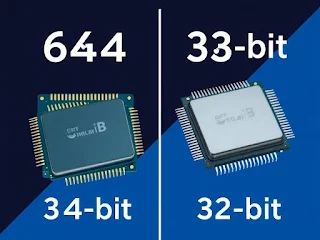What are the differences between 64-bit and 32-bit processors in phones?
One of the most frequently asked questions among tech enthusiasts when it comes to smartphones is the difference between 64-bit and 32-bit processors. Both of these architectures are important in how a phone works, but what does it really mean in terms of performance and overall user experience? Let's dive into the key differences between 64-bit and 32-bit processors and how they impact the functionality of your smartphone.
What is a 32-bit Processor?
A 32-bit processor can handle data in 32-bit chunks-meaning it processes data in sets of 32 bits at a time. In terms of computing power, this puts limits on the processor to efficiently access memory and also handle tasks compared to a 64-bit processor.
The major limitation of a 32-bit processor is its addressable memory. It can address only up to 4GB of RAM. This means that smartphones with 32-bit processors are constrained by this memory limit, which can cause slowdowns in performance, especially when running resource-intensive applications or multitasking.
What is a 64-bit Processor?
On the other hand, a 64-bit processor can handle data in 64-bit chunks, which means it can process the data more efficiently. One of the most significant advantages of a 64-bit processor is its ability to address far more memory than a 32-bit processor. A 64-bit system can theoretically access up to 18.4 million terabytes (TB) of memory, though in practice, phones don't need anywhere near this much.
While recent phones may have only 4GB, 6GB, or even 8GB of RAM, the capability of 64-bit processors to deal with more memory gives them an advantage in performance. With a 64-bit processor, the phone can run more resource-intensive applications, increase multitasking, and deal with more data at the same time.
Key Differences Between 64-bit and 32-bit Processors in Phones
- Memory Addressing
As stated above, the immediate difference between 32-bit and 64-bit processors is in their ability to address memory. A 64-bit processor can address more RAM; this, in turn, results in better performance-which can be particularly useful when multi-tasking, or using memory-intensive applications. - Performance
A 64-bit processor generally offers superior performance. It can process more data at once, leading to faster execution of tasks and smoother performance for demanding apps like games, video editing software, and augmented reality (AR) applications. - Operating System and Software Support
A 64-bit CPU requires an operating system which is of 64-bit to show its full capabilities. The newer versions of Android and iOS are fit for 64-bit processing, so maybe the new software updates, along with applications, don't support the 32-bit processors. - App Compatibility
64-bit processors are backward compatible, meaning they can run 32-bit apps as well as 64-bit apps. However, it is not vice versa. A 32-bit processor cannot support 64-bit applications. This means that over time, as app developers continue to optimize their software for 64-bit systems, 32-bit processors will become increasingly obsolete. - Battery Efficiency
While 64-bit processors happen to give out better general performance, they also make their way into improving the power efficiency. The architecture is designed to handle tasks in a rather efficient manner, meaning devices with 64-bit processors can often optimize battery life compared to their 32-bit counterparts.
Which One is Better for Your Phone?
Well, that depends on your needs. In case you only use your phone to browse, use social media, or just run a few light apps, a 32-bit processor may serve you right. If, however, you're a gamer, creator of content, or other power-consuming apps user, you absolutely need to go with the 64-bit processor option.
Most of the modern smartphones, including flagship ones, come with 64-bit processors. With the development in the tech world, 32-bit processors are not in much use. For most users, choosing a phone with a 64-bit processor ensures better performance, future-proofing, and access to the latest software and features.
Conclusion
Understanding the differences between 32-bit and 64-bit processors will, therefore, be very helpful in making a more informed decision when buying a smartphone. While both types of processors have their place, the 64-bit architecture is more powerful, future-proof, and better suited to handle the demanding apps and multitasking required in today's smartphone environment. If you're looking for optimal performance, it's clear that a 64-bit processor is the way to go.


